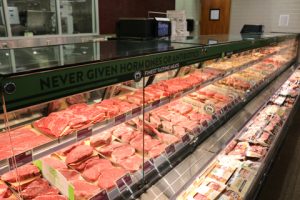Niman Ranch Compliant With New Stricter Animal Welfare Laws
 Beginning Jan. 1, fresh pork sold in California and Massachusetts must be as the two states’ historic animal welfare laws—Proposition 12 and Question 3—are fully implemented and enforceable. Humane animal care leader Niman Ranch is 100 percent audited, compliant and ready for implementation with available supply of crate-free, Certified Humane fresh pork raised sustainably and without antibiotics by independent family farmers.
Beginning Jan. 1, fresh pork sold in California and Massachusetts must be as the two states’ historic animal welfare laws—Proposition 12 and Question 3—are fully implemented and enforceable. Humane animal care leader Niman Ranch is 100 percent audited, compliant and ready for implementation with available supply of crate-free, Certified Humane fresh pork raised sustainably and without antibiotics by independent family farmers.
“The best resolution the pork industry and consumers can make this new year is to commit to crate-free,” said Chris Oliviero, general manager of Niman Ranch. “For too long, the industry has been hyper focused on efficiency and producing large amounts of cheap meat, while losing sight of the bigger picture. Prop 12 is the right thing for both the animals and farmers, but it needs to be done in a structured manner where pork producers have support and dedicated markets. With full implementation of Prop 12 and Question 3 in the new year, there is market certainty and a clear path forward for the industry.”
While gestation crates are the dominant industry practice today, they are out of touch with consumer expectations on base-level humane animal care. A 2021 poll found that 75 percent of Americans say retailers and restaurants have a responsibility to ensure that gestation crates are not used by suppliers, and 65 percent said they would pay more for pork if the company committed to going crate-free.
First passed in Massachusetts in 2016 with 77 percent of voters in support and in 2018 in California with 63 percent of the vote, it has been a long road to full implementation of these landmark laws. Prop 12 and Question 3 ban the use of gestation crates for pork production on farms in the states as well as the sale of certain fresh pork products that are sourced from farms outside the states that do not meet these gestation crate-free standards. Economists have predicted modest price increases and near-term limited product selections. However, industry experts anticipate that volatility will stabilize over time as compliant supply increases.
Gestation crates are widely considered by animal welfare experts to be inhumane. Barely bigger than their bodies, roughly seven feet by two feet, mother pigs are often kept in these gestation crates from the breeding process through the entirety of their pregnancy, 3 months, 3 weeks and 3 days, with no ability to walk, turn around, lay down or fully extend their limbs. Leading humane animal care expert Dr. Temple Grandin compares it to forcing a person to spend months at a time strapped in an airplane seat.
Opponents have fought these laws all the way to the U.S. Supreme Court, which this past May ruled to uphold Proposition 12 and thus Question 3. Niman Ranch submitted an amicus brief in support of Proposition 12 to the Supreme Court that was cited in the majority decision. Implementation of the laws began in July following the decision; however, an enforcement grace period was allowed for non-compliant product previously purchased to be cleared from shelves and freezers through the end of the year.
With the start of 2024, all products on grocery store shelves and served in restaurants in the states of California and Massachusetts must be gestation crate free and compliant with the laws.
While the bulk of the pork industry has announced they have sufficient supply to fulfill the California and Massachusetts markets, stragglers and some in the industry are making a last-gasp effort to roll back the laws with the proposed Ending Agricultural Trade Suppression Act (“EATS Act”) and other similar extreme proposals. The overreaching EATS Act would stifle innovation and penalize farmers who have invested in Prop 12 compliance.
Niman Ranch has been a leading voice in support of Proposition 12 and Question 3. The pork brand has always been not just gestation crate free but also prohibits farrowing crates, teeth clipping, tail docking and antibiotic use. Additionally, the brand requires ample space and deep bedding for pigs to be able to root, roam and play. All Niman Ranch farms with sows have had a third-party on-farm audit for Prop 12 compliance, no simple task due to the brand’s large network of small farms—unlike most pork suppliers with large-scale operations.
Niman Ranch partners with more than 500 independent family farmers raising pigs crate free to supply award-winning restaurants, values-driven quick-service chains like Shake Shack, Pret a Manger and Chipotle, e-commerce sites like ButcherBox and brick and mortar grocers including Harris Teeter, Whole Foods Market, Mariano’s, QFC and Natural Grocers.
“Gestation crates never sat right with me,” said Paul Willis, Niman Ranch’s founding hog farmer who launched the pork brand in the 1990s. “These are intelligent animals who I, as a farmer and caretaker, have a responsibility to provide as low stress a life as possible. I owe them that.”
Niman Ranch is a community of over 600 independent family farmers and ranchers who raise pork, beef and lamb traditionally, humanely and sustainably to deliver the Finest-Tasting Meat in the World. Niman Ranch is the largest farmer and rancher network in North America to be Certified Humane®. The protein of choice for America’s most celebrated chefs, Niman Ranch is also the premier option for discerning home cooks looking for meats Raised with Care®, with no antibiotics or added hormones—ever. Follow Niman Ranch on Facebook, Twitter and Instagram.
For more news of interest to the specialty food industry, subscribe to Gourmet News.






